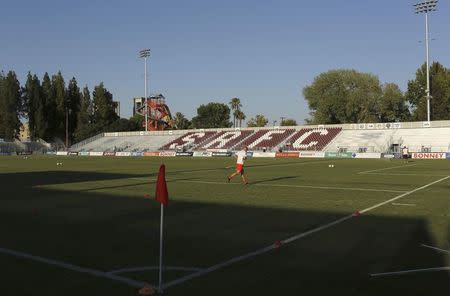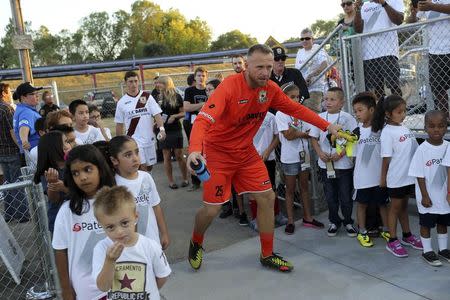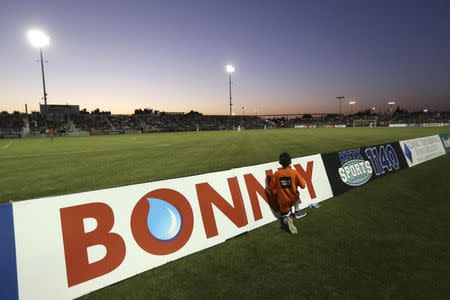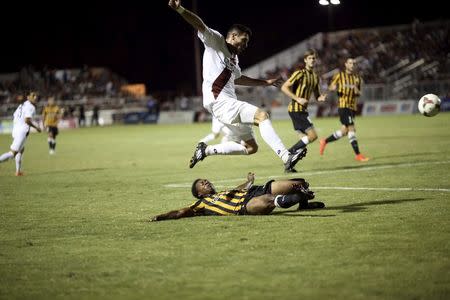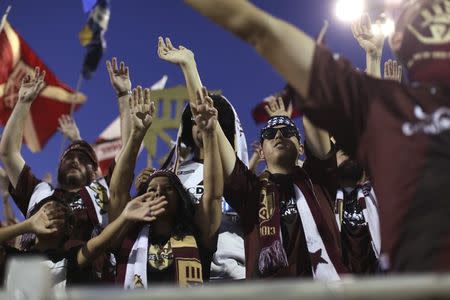Sacramento shoots for soccer after success at keeping NBA Kings
By Sharon Bernstein SACRAMENTO Calif. (Reuters) - After securing its perch as a pro-basketball city amid much controversy last year, Sacramento is now aiming to add Major League Soccer, a move that could help revitalize the California capital and mark it as a regional center for sports. The minor league Sacramento Republic FC soccer club, brought to town this spring as part of the effort to persuade Major League Soccer (MLS) that the city could support a team, has been selling out tickets since its first match attracted 20,000 fans. Next week, executives from the league will tour the downtown site where backers hope to build a stadium big enough to hold them all. "It's hard not to be impressed," said MLS spokesman Dan Courtemanche. "They're setting records there." Sacramento is making its play for soccer just a year after Mayor Kevin Johnson, himself a former NBA star, led a successful effort to keep the former owners of the Kings basketball team from selling that franchise to a group that wanted to move them to Seattle. Johnson sees the soccer bid as an element of the revitalization of downtown that he hopes will start with a glitzy new $477 million arena for the Kings on a site now occupied by a dilapidated shopping mall. Sacramento was hard-hit by the economic recession and is still struggling to recover. "It’s a perfect fit and natural next step in our vision of transforming downtown into a vibrant hub of commerce, culture and entertainment," said Johnson, who hopes to follow up with a performing arts center, science museum and community theater, along with economic development. "It's one piece of a broader puzzle." The former Phoenix Suns point guard's success at mounting a team to save the Kings, including an ownership group led by tech entrepreneur Vivek Ranadive, made waves in the sports world, leading some analysts to view Sacramento as a possible hub under his leadership. "Sacramento from a sports standpoint is a market people have been paying attention to," said David Carter, a sports analyst with the University of Southern California. "Going after a soccer team makes sense." The plan's backers say the game will appeal to millennials whom the city is already wooing with a thriving midtown hipster scene, and to Latinos, who comprise nearly a quarter of the city's residents, as well as other groups. But the deal is far from done. Other cities, including Minneapolis, Las Vegas, San Antonio and Austin are also vying for a team and Sacramento is even competing with one of its own suburbs, Elk Grove. One of the MLS requirements is that the team have a stadium. But despite the considerable political capital and star power expended by Johnson to keep the Kings in town and build them an arena with more than $250 million in public support, the mayor says that a soccer stadium would have to be built with private funds. And even if Sacramento does land the team, there is no guarantee that it will have a major impact on the region or its economy. Soccer is still nascent in the United States compared to Europe and South America, said Chicago based sports consultant Marc Ganis, president of Sportscorp Ltd., and not all of the 19 MLS teams are profitable. Moreover, teams only play about 22 games per year at home per year, limiting the occasions that fans will come downtown to frequent bars, restaurants and shops. To meet those challenges, Johnson and Warren Smith, president of Sacramento Republic FC, have put together a team of some of the same people who worked to keep the Kings in town. Kevin Nagle, a pharmaceutical industry entrepreneur who is the largest local shareholder in the Kings ownership group, has bought a controlling interest in the Republic, the team announced last week. Smith says he is prepared to raise funds privately to build a stadium, a $100 million facility he is considering locating at the downtown site of a former railyard. To draw spectators and build team spirit, Smith’s group has worked hard to accommodate fans, shifting game times to 8 pm so people can come after work and seeking a stadium location that is accessible by public transportation. With a deep-pocketed ownership group led by Nagle, Smith and Johnson hope to show MLS executives they can weather any financial troubles while the team gets off the ground and soccer grows in popularity in the United States. Smith says soccer is well-suited to Sacramento, a mid-sized city of 450,000 people in a metropolitan area that has around 2.5 million. He says the relative newness sport in the United States works to the region's advantage. "We're never going to build a $2 billion football stadium, and we'll never sell enough baseball tickets for a major league team," said Smith, who was instrumental in bringing the city's minor league baseball team, the River Cats, to town. "But we could afford soccer." (Reporting by Sharon Bernstein, editing by Jill Serjeant and Andrew Hay)
